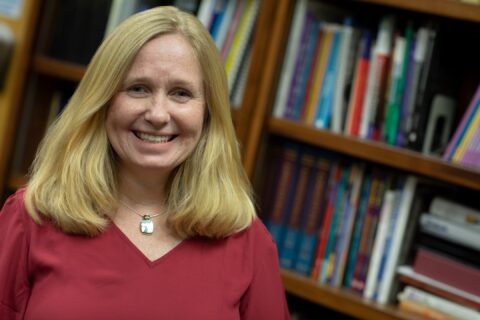Educational Specialist (Ed.S.) in Education – Reading Education
Educational Specialist (Ed.S.) in Education – Reading Education

I love to hear and understand how my students connect their experiences to teaching and learning. As learners come into being with their own understanding of the content, I expect them to take ownership in the learning process.
Associate Professor
Overview
If you have your master’s degree and are looking to further your language and literacy expertise, our highly flexible educational specialist program allows you to pursue topics that interest you in a format that fits your schedule. This degree is also a great opportunity for advanced education if you wish to further your studies but are unsure if a doctorate is for you.
This emphasis will help you hone your pedagogical capabilities within the field of language and literacy education. Choose one of our two emphases (Children’s Literature and Language Arts P-5 or Literature and Language Arts Grades 6-12) to personalize your program in relation to your expertise and interests while earning a certificate upgrade for already Georgia-certified educators. Each program of study involves three core areas:
- Literacy and Children’s Literature content based on certification level
- Research
- Electives aligned with your expertise, credentials, and interests
Highlights:
1. Annually, among U.S. News & World Report’s Top 10 graduate programs in Curriculum & Instruction since 2015
2. For working teachers who already hold a master’s degree
3. Earn a certificate upgrade when your studies align with initial certification
Accreditations
The University of Georgia is accredited by the Southern Association of Colleges and Schools Commission on Colleges (SACSCOC) to award baccalaureate, master’s, specialist, and doctoral degrees. The University of Georgia also may offer credentials such as certificates and diplomas at approved degree levels. Questions about the accreditation of the University of Georgia may be directed in writing to the Southern Association of Colleges and Schools Commission on Colleges at 1866 Southern Lane, Decatur, GA 30033-4097, by calling (404) 679-4500, or by using information available on SACSCOC’s website (www.sacscoc.org).
Admissions
Admission Requirements
- Hold a master’s degree from an accredited college or university in an area of language and/or literacy education, or a related field.
- Have a recommended two or more years of teaching experience
- Have a graduate grade point average of 3.0 from prior degrees.
- Please indicate in your statement of purpose which area of emphasis below you intend to pursue for the Ed.S. program (Reading, Children’s Literature, and Language Arts [RECL], Gr. P-5 or Reading, Literature, and Language Arts, Gr.6-12 Reading [RLLA]).
Online Educational Specialist (Ed.S.) in Reading Education Application Checklist
- Application – Submit the Graduate School Admissions online. Application fee: $75.
- Select Campus – Online
- Select Degree Level – Educational Specialist
- Select Intended Program – EDS, Education (College of Education) [EDS_EDUC_ONL]
- Select Area of Emphasis –
- Reading, Children’s Literature, and Language Arts P-5
- Reading, Literature, and Language Arts Grades 6-12
- Select Intended Term – Fall or Summer
- Résumé or curriculum vitae – Submit online to the Graduate School.
- Statement of Purpose – Statement of Purpose- Submit a one to two-page statement of purpose online to the Graduate School. The statement should include applicant’s current teaching role, previous formal or informal leadership roles, and expectations of how this Ed.S will help you in the future. Please specify which are also emphasis you will pursue: Ed.S. program (Reading, Children’s Literature, and Language Arts [RECL], Gr. P-5 or Reading, Literature, and Language Arts, Gr.6-12 Reading [RLLA]).
- Transcripts – Submit unofficial transcripts from all institutions attended as part of the online application. Send official transcripts after you are offered admission.
- Letters of Recommendation – Submit three letters of recommendation online to graduate school. Letters should be from individuals who can evaluate the applicant’s scholarly ability and potential for success in a graduate program
Application Deadlines
Domestic Applicants
- Fall: June 1
- Summer: April 1
International Applicants
- Fall: June 1
- Summer: April 1
Cost
Tuition rates and student fees may change each year.
Based on 2024-25 credit-hour cost, a person who had completed this program at the recommended pace would have paid $12,810 in tuition for a Georgia Resident and $38,610 in tuition for an out-of-state student.
Please use the Estimated Cost Calculator on the Bursar’s Office website to calculate one academic (Fall/Spring) year’s tuition.
Fees for those students enrolled in exclusively online programs are $422 per semester.
Potential additional costs include:
- Textbooks
- Exam proctoring fees
- Technology upgrades
The complete cost of attendance can be found at https://osfa.uga.edu/costs/.
Financial Aid
Visit the Office of Student Financial Aid for information about financial assistance.
Corporate Assistance
Consult your employer about the availability of tuition reimbursement or tuition assistance programs.
Military Assistance
Active-duty military, veterans, and military families should visit Veterans Educational Benefits to take full advantage of available financial assistance and educational benefits.
University System of Georgia Tuition Assistance Program (TAP)
The purpose of TAP is to foster the professional growth and development of eligible employees. For more information, see Tuition Assistance (refer to the Distance Learning section).
Curriculum
The area of emphasis requires 30 credit hours and is typically comprised of 9-10 courses, depending on the number of credits per course. Electives are jointly planned by the student and advisor. Coursework in this area of emphasis includes:
- 6 hours of literacy methods and content
- 6 hours of children’s and/or young adult literature
- 3 hours of research
- 3 hours of an applied project
- 12 hours of electives
You’ll work with an advisor to design a flexible program that works for you and your academic goals.
If you align your studies with your initial certification, you should be able to earn a certificate upgrade in that area. Please check with the Georgia Professional Standards Commission to confirm your eligibility for a certificate upgrade.
You may also pursue add-on endorsement certificates such as reading, gifted education, ESOL, dyslexia, or educational leadership as part of your program of study.
Year 1
| Term | Type | Course | Course Title | Credit Hours |
|---|---|---|---|---|
| Fall | Required (Literacy Content Course) | LLED 8345E | Theories and Models of Reading | 3 |
| Fall | Required (Children’s & Young Adult Literature) | Select from Children’s Literature and Young Adult Course Options List | 3 | |
| Spring | Required (Children’s & Young Adult Literature) | 3 | ||
| Spring | Literacy Methods Course | 3 | ||
| Summer | Elective 1 | 3 | ||
| Summer | Elective 2 | 3 |
Year 2
| Term | Type | Course | Course Title | Credit Hours |
|---|---|---|---|---|
| Fall | Required Research Course | Select from Research Course Options | 3 | |
| Fall | Elective 3 | 3 | ||
| Spring | Required Applied Project | LLED 7650E | Applied Project in LLED | 3 |
| Spring | Elective 4 | 3 |
| Literacy Methods & Content Course Options | Children’s Literature and Young Adult (CYAL) Course Options | Research Course Options |
|---|---|---|
| LLED 6020e Practicum in Reading Instruction & Assessment | LLED 6300e Sociopolitical Trends in Children’s and Young Adult Literature | LLED 7070e Research Methods in Language Education |
| LLED 6060e Content Area Literacies | LLED 6340e International Children’s Literature | QUAL 6200e Introduction to Qualitative Research Methods |
| LLED 6490e | LLED 6410e Adolescent and Young Adult Literature for a Changing World | QUAL/ESSE/ERSH 7500e Teacher Action Research |
| LLED 7045e Special Topics | LLED 7314e Informational Lit, Grades P-8 | Another course approved by student’s advisor |
| LLED 7110e Integrating Digital Resources in Literacy Classrooms | LLED 7318e Culturally Diverse Child Lit, Grades P-8 | |
| LLED 7325e Social Cultural Perspectives of Dyslexia | LLED 7335e Critical Readings of Picture Books | |
| LLED 8340e History of Literacy Learning in the U.S. | LLED7345e Reading Immigrant Children’s Literature | |
| LLED 7710e: Writing Cultures: A Poetry Workshop for Creative Educators | LLED 7545e Diverse Children’s Literature in a Digital Age | |
| LLED 7940e Electronic Assessment in Literacy Classrooms | Another CYAL course approved by student’s advisor | |
| LLED 8330e Pop Culture in the Literacy Classrooms | ||
| LLED 8360e Literacy Frameworks and Practices with Special Populations | ||
| LLED 8732e Discourse Analysis for Educators | ||
| LLED 7810e Teachers as Theorists in English Education (Gr. 6-12) | ||
| LLED 7825e Teachers as Writers in English Education (Gr. 6-12) | ||
| LLED 7835e Theories and Practices in Teaching Secondary Readers | ||
| Another course approved by student’s advisor |
Faculty
Licensure
This program is designed to enable you to practice in a licensed profession through initial certification in the state of Georgia. If you apply to this program from a state outside of Georgia with the plan to work in Georgia, you will be given the opportunity to attest to that intention when you apply.
An enrollment coach will contact you to determine your circumstances and ensure that this program will be effective for you.
Additional information and disclosures regarding state licensure for professional practice in this field can be found at the UGA Licensure Disclosure Portal.
News & Events
No news articles found
Contact Information
Contact us using the request for information form or call .



